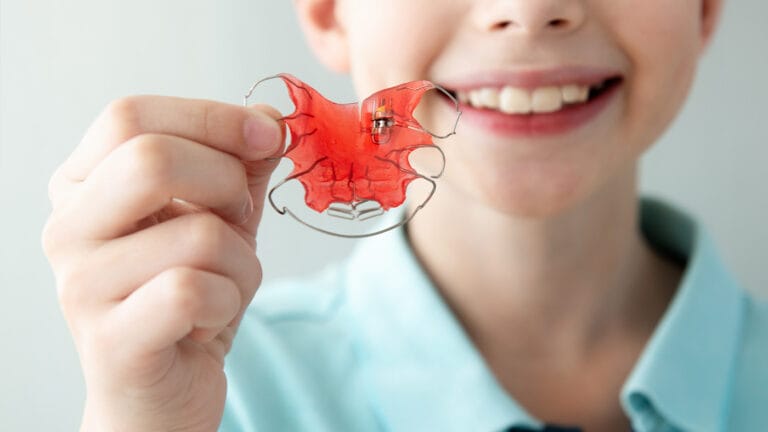Convenient dental care close to home. How to choose a pediatric dentist with an all-in-one approach.
The first few years of your child’s life happen fast, with developmental milestones flying by seemingly every day. Before long, your child’s first teeth will emerge, and you’ll suddenly have to figure out how to care for them.
Children should visit the dentist within six months of the first tooth erupting or by their first birthday, whichever comes first. Choosing your child’s dentist is a big decision that will set the stage for their lifelong dental health. A dentist will examine your child’s teeth and jaw, outline any potential issues coming down the line, and provide guidance to help ensure your child has happy, healthy chompers.
In your search, you’ll find general dentists, family dentists, and pediatric dentists. So, what are the differences between them? While any dentist will do, there are some benefits to choosing a pediatric dentist specially trained for dealing with still-developing teeth.
What is the difference between a pediatric dentist and a general dentist?
While there are no fundamental differences between a general dentist and a family dentist, there are differences between a pediatric dentist and a general or family dentist. While general or family dentists treat adults and children, a pediatric dentist specializes in treating children. They study the development of primary dentition (baby teeth), mixed dentition (a combination of baby teeth and permanent teeth), and a host of other child-specific conditions.
- Specialized Education: Like all dentists, general dentists graduate from a four-year undergrad program, complete four years of dental school, and get a license from the state they practice in. By contrast, pediatric dentistry is a specialty. After dental school, pediatric dentists complete a specialized two-year residency program focusing on child psychology, behavior management, and the unique needs of children’s teeth.
- Child-friendly Environment: Pediatric dentist offices are designed to be playful and welcoming to young minds. They usually incorporate more playful decorations, furniture, aquariums, prizes, and other elements to make the dental experience more enjoyable.
- Pediatric Dentists are Trained to Understand and Work with Childhood Anxieties: Like many adults, some children struggle with medical environments and personnel. Being a pediatric dentist isn’t just about understanding how tiny teeth work but also how little minds work.
- Age-appropriate Communication: Pediatric dentists are trained in specialized techniques for treating young children’s teeth, but they are also trained to communicate effectively with kids. Children need to understand their own health, and pediatric dentists can communicate dental information in a developmentally appropriate manner, allowing children to take an active interest in their own dental health.
Choosing a Pediatric Dentist
Baby teeth aren’t just smaller versions of adult teeth; they have unique anatomy and challenges. Pediatric dentists understand the differences and know how to treat both baby and permanent teeth, as well as a combination of both.
They understand how dental interventions will unfold over time and how to implement small interventions early to prevent major problems later. Because your child’s jaw is still malleable, if they lose a tooth early or have one pulled, the other teeth may shift out of their natural position. A pediatric dentist can take action to keep the rest of the teeth in their correct positions until the adult tooth comes in. By contrast, a pediatric dentist will recognize when a lingering baby tooth might get in the way of adult teeth and must be removed to clear the way. And that’s just for starters.
While any dentist can provide general dental care, a pediatric dentist has a deeper understanding of adolescent dentition and a broader range of treatment options for helping children. Your child’s jaw and teeth will continue to develop throughout childhood and adolescence; pediatric dentists are trained to understand how the mouth evolves during that time.
During their two-year residency, pediatric dentists are trained in advanced diagnostic and surgical procedures alongside child psychology and clinical management, oral pathology, child-related pharmacology, radiology, child development, care for patients with special needs, conscious sedation, general anesthesia, and other related specialties.
Your child’s first dental visits will lay the foundation for their lifelong dental health, and a pediatric dentist gives them the best early defense in the fight against cavities, tooth decay, gum disease, and more. Our Free Under Three program makes it easy for your child to visit our office, meet the dentist, and get a dental exam. Claim the free exam here.





